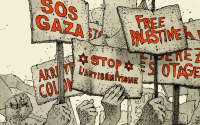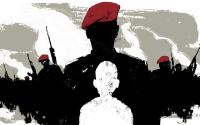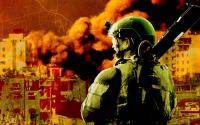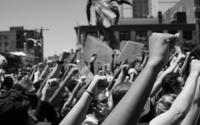The Palestinians had told me I would never understand them unless I met Arafat, whom they called the Old Man. So we bounced from jeep to jeep through the hot dark of Beirut till we came to an L-shaped drawing room lined with fighting men who were managing not to smoke in the Old Man's presence. And there in the small part of the L he sat, wearing a white keffiyeh, khaki shirt, a uniform with razor-sharp creases and a silver-handled pistol holster of plaited brown plastic.
He was signing letters on an imitation leather blotter and for a moment he reminded me of Charlie Chaplin doing the same job in The Great Dictator. His body had the floppiness of unuse and the whiteness of a prisoner.
I had been warned that he never slept in the same bed twice, was obsessive about hygiene, managed his own security arrangements and was abstemious in everything except his love for Palestine.
Discovering me - the room was by now dead silent - he rose to his feet advanced on me and without a word folded me in the traditional embrace. It was hard to think of him as the perpetrator of a string of atrocities, but a lot of murderers have been famously cuddly when off-duty.
The stubble on his cheeks was silky not prickly. It smelt of Johnson's Baby Powder. I had heard that in medieval times executioners embraced those they were about to kill, but nobody said they wore baby powder.
We separated, but he kept his hands on my shoulders and continued to dote on me. There was anxious questioning in the bubbly brown eyes, and an almost erotic need to win me.
"Mr David, why have you come here?" he demanded, unexpectedly using my Christian name while he studied me, eyes like a worried doctor.
"Mr Chairman, I have come to put my hand on the Palestinian heart."
He seized my hand and pressed it to his breast. "Mr David! It is here! It is here!"
Arafat had the Palestinian face as well. It begged you to stay and listen and care. He could light it up like a beacon, fool with it like a clown, let it lapse into statesmanlike severity, but he could never let it go fallow, and if I was looking for a hint of the bloody history that lay behind it, I looked in vain.
He would make his eyes dance so merrily that you had to be a churl not to respond in kind. He talked in soft rushes of enthusiasm, punctuating a standard act with inspirational leaps to suit his audience.
He could lecture you like a schoolmaster, or stare at you like a spellbound disciple while he listened to your wisdom. But the face that appeared between-times was the face of a desperate little soldier who had lost his horse, and you felt an irresistible urge to go and find it for him.
The last time I saw him, he had found it for himself. It was a pretty white Arab and he was riding it round the ring of the White Hotel outside Tunis that was his new place of exile, now that Sharon had chased him out of Lebanon.
The boy who took me to him held a pistol to my head and wanted to shoot me in revenge for the massacres of Sabra and Shatila.
Soon afterwards, an Israeli hit-team assassinated half his high command, thus giving a chance to the young ones coming up. Perhaps the boy was one of them. There will always be more boys.
http://www.guardian.co.uk./print/0,3858,5061410-103552,00.html






